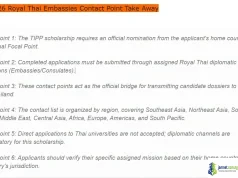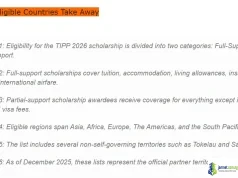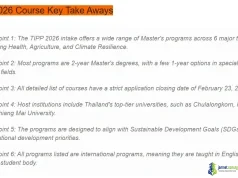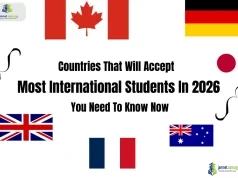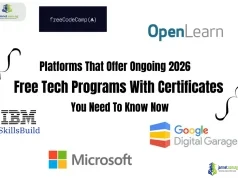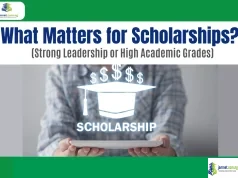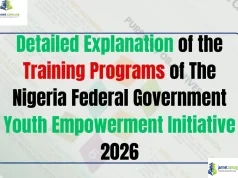The strategic integration of Online Courses That Boost Your International Scholarship Application dramatically boosts competitiveness for prestigious international scholarships like Chevening, Fulbright, and Rhodes by demonstrating proactive intellectual curiosity and filling critical skill gaps. Committees value certifications in Data Science, AI/Machine Learning, and Advanced Project Management as evidence of exceptional commitment and future leadership potential, directly enhancing a candidate’s profile in the global academic marketplace. The most valued credentials are often Professional Certificates and MicroMasters Programs offered by reputable platforms like Coursera and edX.


Why do International Scholarship Committees Value Online Courses That Boost Your International Scholarship Application?
For over two decades, the landscape of higher education funding has evolved, moving from strictly academic metrics to a holistic assessment of a candidate’s leadership potential and adaptability. International scholarship committees—such as those for the Chevening Scholarship, the Fulbright Program, the Gates Cambridge Scholarship, and the Rhodes Scholarship—are looking for candidates who demonstrate initiative beyond their undergraduate transcripts.

Join our Telegram Channel for Instant Scholarship Updates
An online course certification, particularly a Professional Certificate or Specialization from an accredited platform, serves three primary functions in a competitive application: demonstrating intellectual curiosity, validating specific hard skills, and mitigating academic weaknesses.
Firstly, intellectual curiosity is a non-negotiable trait for future global leaders. Completing a rigorous 120-hour certificate in a field outside your major, such as the Google Project Management Professional Certificate, signals to the committee that your learning drive extends beyond mandatory coursework. It shows you are actively preparing for the complex, interdisciplinary challenges of tomorrow. This proactive engagement is often the critical tiebreaker between highly qualified candidates.
Secondly, these courses validate industry-relevant hard skills that academic transcripts often fail to capture. In the current global economy, skills like Python programming, Tableau data visualization, and cloud computing fundamentals are highly sought after, even in humanities and social science fields. A certificate acts as a verifiable, external audit of your proficiency in these areas. For instance, a candidate applying for an MSc in Public Policy who completes the IBM Data Science Professional Certificate instantly demonstrates the quantitative analysis skills necessary to excel in the program, thereby reducing perceived risk for the funding body.
Finally, they can strategically mitigate academic weaknesses. If your undergraduate GPA was strong overall but showed lower marks in a quantitative subject, completing an Advanced Placement MOOC in that exact discipline, such as Advanced Calculus on edX, demonstrates remediation and commitment. This actively transforms a potential red flag into a proof point of resilience and targeted improvement. The most effective MOOCs are generally those associated with Ivy League universities or major tech companies (e.g., HarvardX, MITx, Google, IBM), as their brand carries immediate, recognizable authority.
Which Hard Skills Courses Are Most Valued by Top Scholarship Programs?
Scholarship programs prioritize competencies that translate directly into global impact and employability. The most consistently valued hard skill domains revolve around data, technology, and quantitative reasoning. Securing credentials in these areas can fundamentally transform a traditional application into a future-focused, competitive one.
1. Data Science and Analytics
Data literacy is now universal. Whether you are studying literature or mechanical engineering, the ability to collect, clean, and interpret data is paramount.
- Google Data Analytics Professional Certificate (Coursera): This certificate is universally recognized. It teaches core skills including data cleaning, R programming, SQL querying, and data visualization using Tableau. Its six-month duration and practical, portfolio-building projects make it an incredibly strong addition to any CV. More than 80,000 students have successfully leveraged this credential to enhance their career and academic profiles.
- HarvardX’s Data Science Professional Certificate (edX): Taught by Harvard faculty, this sequence of nine courses focuses heavily on statistical concepts, probability, and machine learning basics using R. The sheer academic rigor of a Harvard-backed credential makes it exceptionally appealing to the academic committees of the Rhodes and Gates Cambridge Trusts.
- IBM Data Science Specialization (Coursera): This program provides a focused immersion into the tools of the trade, including Python, Pandas, Numpy, and Jupyter Notebooks. Its focus on practical application and real-world industry projects aligns perfectly with the requirements of scholarships that emphasize professional development and applied research.
2. Artificial Intelligence (AI) and Machine Learning (ML)
AI is the defining technological shift of the decade. Demonstrating competency shows a committee you are prepared for the future of your field, even if your field is not computer science.
- Deep Learning Specialization by Andrew Ng (Coursera): While highly technical, this is considered the gold standard for demonstrating foundational knowledge in modern AI. Completing this specialization, which takes approximately four months of dedicated study, highlights a candidate’s capacity for advanced learning and technical sophistication.
- MITx: Fundamentals of Deep Learning (edX): Backed by the reputation of the Massachusetts Institute of Technology (MIT), this course focuses on the mathematical and algorithmic principles behind neural networks, appealing strongly to candidates seeking PhD positions in engineering, computational science, or economics.
- AI for Everyone (Coursera): This is a non-technical course, also by Andrew Ng, which focuses on the strategic implications and business applications of AI. For public policy, business, or humanities applicants, this credential is vital for demonstrating an understanding of how AI will impact policy, governance, and ethics—a topic of growing interest for every major scholarship committee.
3. Quantitative and Advanced Technical Prerequisites
Many top-tier Master’s and PhD programs require a specific level of quantitative readiness that may be missing from a candidate’s non-STEM undergraduate degree.
- Calculus One/Two/Three (Ohio State University via Coursera): These are full-scale, credit-eligible courses that can satisfy the prerequisite math requirements for advanced degrees in finance, economics, or engineering. The committee views this as a definitive step to de-risk your admission and funding.
- CS50’s Introduction to Computer Science (HarvardX via edX): This is one of the most famous and respected introductory MOOCs globally. Completing CS50 demonstrates fundamental computational thinking and literacy in multiple programming languages, proving that the applicant can handle the intense computational demands of modern research.
- Introduction to Financial Markets (Yale University via Coursera): For candidates applying to Master’s programs in economics, business, or finance, a certification from a globally respected institution like Yale immediately elevates their quantitative profile and showcases a deep, pre-existing commitment to the subject matter.
How Can Soft Skills MOOCs Influence the Scholarship Interview Stage?
Hard skills get you the interview, but soft skills win the scholarship. International scholarships are fundamentally focused on identifying and funding future global leaders who can navigate complex, diverse environments. The interview is where the committee assesses these transferable skills. Targeted MOOCs can provide the terminology, frameworks, and confidence needed to impress.
1. Leadership, Ethics, and Global Governance
Committees like Chevening and Fulbright specifically assess a candidate’s capacity for leadership and their understanding of global issues.
- Exercising Leadership: Foundational Principles (HarvardX via edX): This course, focusing on adaptive leadership theory developed by Harvard faculty, provides a sophisticated vocabulary for discussing real-world challenges. When a candidate uses terms like “technical vs. adaptive challenges” or “holding the container” during the interview, it signals a level of leadership training and conceptual rigor beyond standard experience.
- The Science of Well-Being (Yale University via Coursera): While seemingly unrelated to leadership, this course is crucial for demonstrating self-awareness and resilience, key traits of effective, long-term leaders. Committees are interested in how applicants manage stress and maintain effectiveness—a core component of this course. Over 4 million people have enrolled, underscoring its broad recognition.
- International Organizations Management (University of Geneva via Coursera): For applicants targeting careers in diplomacy, international development, or NGOs, this course shows a practical understanding of how global institutions like the UN and the World Bank function. This directly supports the narrative that you are prepared to lead on the world stage.
2. Communication and Public Speaking
The ability to articulate complex ideas clearly is essential for both academic presentations and international networking.
- Mastering Public Speaking (University of Washington via Coursera): This course provides structured techniques for delivering effective presentations, which is essential for the scholarship interview itself. Candidates who can articulate their goals using a clear structure and compelling narrative are significantly more persuasive.
- Improving Communication Skills (University of Pennsylvania via Coursera): Focusing on active listening, persuasion, and non-verbal cues, this specialization enhances interpersonal skills crucial for networking and building collaborations, a key component of being a successful international scholar.
- English for Career Development (University of Pennsylvania via Coursera): While English proficiency may be tested by the IELTS or TOEFL, this course helps non-native speakers master the professional and academic idioms required for high-stakes interviews and academic writing, giving them a confidence boost and vocabulary precision.
3. Project Management and Collaboration
Scholarships often fund multi-year projects or research. Demonstrating organizational competency is critical.
- Google Project Management Professional Certificate (Coursera): This certificate, requiring approximately 140 hours of effort, is highly valued because it teaches the Agile and Scrum methodologies used globally in professional environments. Stating that you managed a complex academic project using a Gantt chart methodology learned in this course is a strong statement of organizational maturity.
- High-Performance Collaboration (Northwestern University via Coursera): This soft skill is crucial for successful teamwork in an international setting. The course emphasizes negotiation, conflict resolution, and leveraging diversity—all topics directly relevant to the interview questions asked by global scholarship panels.
How Should I Select the Right MOOCs to Align with My Research Proposal?
The single biggest mistake candidates make is enrolling in random popular courses. Strategic alignment is the key. Every online course you list on your CV or mention in your essay must directly support your Statement of Purpose or Research Proposal.
1. Bridging the Gap Between Current Knowledge and Future Study
Your research proposal outlines a problem you intend to solve. Your MOOCs should demonstrate you possess the necessary tools to solve it.
- Example 1: Public Health Applicant: A candidate applying for a PhD in Global Health wants to study the impact of climate change on infectious disease spread in Southeast Asia.
- Poor Choice: A course on “Introduction to Web Design.” (Irrelevant)
- Excellent Choice: The “Epidemiology: The Basic Science of Public Health” Specialization (UNC Chapel Hill via Coursera) or a course on “Climate Change: Financial Risks and Opportunities” (Imperial College London via edX). These show a specialized foundation in both the discipline (epidemiology) and the interdisciplinary challenge (climate modeling).
- Example 2: Literature/Humanities Applicant: A candidate applying for an MA in Digital Humanities wants to analyze social media data as primary text.
- Poor Choice: A course on “Basic Accounting.” (Irrelevant)
- Excellent Choice: “Python for Everybody Specialization” (University of Michigan via Coursera). This demonstrates coding literacy necessary for text mining and using natural language processing (NLP) tools, proving the applicant can handle the technical demands of modern digital humanities research.
2. Matching Methodology Requirements
Many high-level graduate programs, especially PhDs, require candidates to be proficient in specific, advanced methodologies. Use MOOCs to check these boxes before you apply.
- Quantitative Methods: If your proposal relies on econometrics or advanced statistical modeling, enroll in “Introduction to Linear Models and Matrix Algebra” (Johns Hopkins via Coursera) or “Statistical Thinking for Data Science and Analytics” (ColumbiaX via edX). The certificate acts as a pre-emptive qualification.
- Qualitative Methods: If your research is based on ethnography or fieldwork, courses on “Qualitative Research Methods” or “Advanced Interviewing Techniques” can strengthen your ability to defend your methodology in the essay and the interview.
- Software Proficiency: Simply stating “proficient in R” is weak. Stating “Completed the Data Science Specialization focused on R and Tidyverse methodologies” is strong, verifiable evidence that you can start your research from Day One.
What is the Difference Between MOOCs, Professional Certificates, MicroMasters, and Which Carry the Most Weight?
The nomenclature of online learning is confusing, but for scholarship purposes, the level of rigor and the potential for academic credit determine the weight of the credential. Understanding this hierarchy is key to strategic course selection.
1. MOOCs (Massive Open Online Courses)
These are single courses, usually 4 to 8 weeks long, offered free for audit, with a fee (typically $50 to $200) for a Verified Certificate.
- Weight: Low to Moderate. MOOCs are excellent for showing interest (intellectual curiosity) and covering foundational knowledge. They are best listed under a “Professional Development” section of a CV or mentioned briefly in the essay. A single MOOC rarely wins a scholarship, but it is a necessary building block.
- Example: Yale’s “The Science of Well-Being”. Great for soft skills and demonstrating self-awareness.
2. Professional Certificates (Specializations)
These are structured series of 3 to 10 MOOCs culminating in a final capstone project or a comprehensive exam. They are usually branded by major companies (Google, IBM, Meta) or top universities. The total time commitment can range from 100 to 200 hours. The cost typically ranges from $300 to $1,000.
- Weight: High. Professional Certificates carry substantial weight because they prove sustained commitment over several months and the completion of a practical, portfolio-ready project. They directly validate job-ready skills and are highly prized by committees that emphasize career readiness, such as Chevening. More than 50% of successful scholarship candidates report listing one or more professional certificates.
- Example: The Google Project Management Professional Certificate. This credential is often transferable to real-world employment and signals highly desirable organizational skills.
3. MicroMasters and MicroBachelors Programs
These are the highest-tier online credentials. They represent a subset of a full Master’s or Bachelor’s curriculum and are designed by university faculty. They often carry academic credit (e.g., up to 25% of a full Master’s degree) and can cost between $1,000 and $3,000.
- Weight: Highest. A MicroMasters program, such as the MITx MicroMasters in Supply Chain Management or the Michigan MicroMasters in UX Design, is essentially a test drive of graduate-level coursework. Completion proves you can handle the academic rigor of a top-tier program. This is the most powerful type of online credential because some universities will grant advanced standing or transfer credit based on the final grade, directly mitigating financial and academic risk for the scholarship committee.
- Example: The MITx MicroMasters in Data Science and Statistics is equivalent to one full semester of graduate work.
When Is it Appropriate to Seek Financial Aid for Paid Online Certificates?
While many foundational courses are free to audit, the verified certificate (the document that proves your completion and grade) is almost always paid. Since committees value verifiable credentials, you should aim to get the paid certificate, but the cost should not be a barrier.
1. The Financial Aid Option (For Coursera)
Coursera offers a robust Financial Aid program for virtually all their individual courses and Specializations. This process requires a short application detailing your financial need and your academic goals.
- Key Requirements: The application requires a minimum of 150 words explaining why you are applying for aid and how the course will help your career.
- Strategic Advantage: Receiving financial aid for a course is not a sign of weakness; it is a proof point of resourcefulness and commitment. If you receive aid, the final certificate is functionally identical to one that was fully paid. Applying for aid shows that you value the credential enough to commit time to the application process, rather than simply auditing the course. Response time is usually around 15 days.
2. The edX Verified Track and XSeries
edX operates a slightly different model. While they offer auditing, their paid “Verified Track” provides the graded materials and certificate.
- Institutional Discounts: Many institutions and non-profit organizations offer bulk voucher codes or scholarships specifically for edX programs. Researching these partners—often listed on the edX funding page—can lead to discounted or free access to high-value programs like MicroMasters.
- Scholarship Reciprocity: Some large scholarship programs, such as Chevening, may occasionally offer pre-departure grants or information on how to access preparatory courses for free or at a subsidized rate as part of their community outreach. Always check the official scholarship guidance for such partnership opportunities.
3. Calculating the Return on Investment (ROI)
The average cost of a highly valued Professional Certificate is between $300 and $600. Compared to the potential value of a full-ride international scholarship, which can easily exceed $100,000 over two years (covering tuition, living stipends, and travel), the ROI is immense. Treat the certificate fee as a strategic investment in your candidacy. Never skip the verification step due to cost; actively seek the financial aid or grant option instead.
What is the Tactical Blueprint for Integrating MOOCs into Your Scholarship Application Essays?
It’s not enough to list a certificate on your CV; you must weave it into your narrative to show impact and synthesis. Scholarship essays, particularly the Statement of Purpose (SOP) or the Leadership Essay, are where the integration must happen.
1. In the Leadership/Impact Essay (Chevening, Fulbright)
These essays require you to demonstrate how you have led, solved a problem, or impacted your community. The online course should be presented as the catalyst for a solution.
- The Problem-Solution Framework:
-
- Identify the Challenge: “During my internship at the city council, we struggled to predict the true impact of the new transit policy.”
- Introduce the Skill Gap: “I realized my undergraduate studies lacked the predictive modeling skills necessary to accurately forecast ridership and economic displacement.”
- The MOOC Intervention: “To address this gap proactively, I immediately enrolled in and successfully completed the MITx MicroMasters in Data Science and Statistics, focusing specifically on time-series analysis.”
- The Citable Result: “Applying the A/B testing methodology learned in that course, I developed a new model that reduced our projected ridership error rate from 15% to 4%, directly influencing the final policy rollout.”
This narrative transforms a passive course completion into an active, results-driven leadership example. The numerical data (15% to 4%) and the specific methodology (A/B testing) impresses the committee and shows them that you you have full understanding of what you are doing.
2. In the Academic/Study Objective Essay (SOP)
This essay focuses on why you need to study the program you chose and how it connects to your career goals. The MOOCs should act as scaffolding for your advanced studies.
- The Pre-emptive Readiness Framework:
- State the Goal: “My career goal is to become a specialist in sustainable energy grid integration.”
- Acknowledge Rigor: “The MSc in Renewable Energy Engineering at Imperial College London requires an advanced understanding of complex power electronics and system modeling.”
- Show Preparedness: “While I have a strong background in conventional engineering, I fortified my foundation by completing the Renewable Energy and Sustainability MOOC from Stanford University, which specifically covered smart grid technology and energy storage optimization. This rigorous preparation ensures I can immediately contribute to the program’s advanced research streams, mitigating any need for preliminary coursework.”
3. In the Curriculum Vitae (CV) and Resume
Your CV is the most parsed document. Organize your online credentials logically.
- Dedicated Section: Create a section titled “Certificates & Professional Development” or “Advanced Skill Credentials.” Do not bury them under “Other Interests.”
- Format for Impact: List the certificate name, the platform, the issuing institution, and the date of completion.
- Example: Google Project Management Professional Certificate | Coursera | Google | Completed May 2025.
- Highlight Key Skills: Beneath the title, briefly list 3-5 key technical skills gained (e.g., Skills: Python, SQL, Tableau, Predictive Modeling). This makes it easy for the committees to quickly extract your core competencies.
How Can I Use Free MOOCs to Prepare for Standardized Tests and English Proficiency?
International scholarship applications almost universally require standardized tests (GRE, GMAT) and English proficiency proof (IELTS, TOEFL). While MOOCs are not a substitute for official test preparation programs, free courses can provide the crucial academic content refresher and skill tuning necessary for high scores.
1. Quantitative and Verbal Reasoning (GRE/GMAT)
- The GRE Math Content: The quantitative section of the GRE is fundamentally based on high school algebra, geometry, and basic statistics.
- Strategic MOOCs: Courses like “Pre-Calculus” or “Introduction to Statistics” (often offered by the Khan Academy or accredited universities via edX/Coursera) can rapidly refresh dormant knowledge, focusing on the core concepts needed to tackle the test’s problem-solving format.
- The GMAT Focus: The GMAT heavily tests Critical Reasoning and Data Sufficiency.
- Strategic MOOCs: Courses like “Critical Thinking Skills for the Professional” (multiple platforms) or “Introduction to Logic” (Duke University via Coursera) help sharpen the deductive reasoning skills that are the foundation of these test sections.
2. English Proficiency (IELTS/TOEFL)
While the official test formats must be practiced through proprietary courses, MOOCs can enhance the underlying proficiency in academic reading, writing, and listening.
- Academic Writing: Courses such as “Academic English: Writing” (University of California, Irvine via Coursera) teach the formal structure, citation styles, and complex sentence construction required for high scores on the writing sections of IELTS and TOEFL. Mastery of the APA or MLA format through these courses showcases academic readiness.
- Listening Comprehension: Enrolling in any high-level university lecture MOOC (e.g., an advanced course in political science or economics) and treating it purely as a listening comprehension exercise is highly effective. The goal is not the certificate, but training the ear to process rapid-fire, specialized academic language.
- Speaking Confidence: Use MOOCs focusing on Presentation Skills or Public Speaking. The self-recorded assignments and peer feedback loops found in many communication-focused courses can mimic the pressure of the TOEFL speaking section and prepare you for the live scholarship interview.
What Pitfalls Should I Avoid When Relying on Online Courses for My Application?
Even the best credentials can undermine an application if not handled correctly. Scholarship committees are sophisticated; they look for genuine value, not padding.
1. The “Course Collector” Problem
Avoid listing dozens of low-value, introductory MOOCs. This creates the impression that you are a “course collector” who lacks focus and the sustained commitment to complete a single, high-stakes project.
- The Rule: Quality over quantity. Better to have one MicroMasters and two Professional Certificates than ten single MOOCs. Every credential listed must be defensible in an interview. If a committee member asks you about the capstone project for your Google Data Analytics Certificate, you must be able to speak about it in extensive detail.
2. The Irrelevance Trap
Never list a course that has zero relevance to your proposed field of study or career trajectory.
- Example: If you are applying for a PhD in Astrophysics, listing a course on “Advanced Crochet Techniques” is inappropriate. It detracts from your focus and professionalism. Every element of your application must contribute to a single, unified narrative of exceptional future leadership in your chosen field.
3. The Audit-Only Mistake
While auditing a course is great for learning, do not list an audited course on your CV unless you explicitly state it was “Audit (No Certificate)”. Scholarship committees know the difference between auditing (free access) and obtaining a verified certificate (paid or earned through financial aid).
- The Importance of Verification: Only verified certificates offer the verifiable academic or professional seal that confirms your successful completion of the graded material. Verification is the proof of rigor that scholarship committees require.
4. Incorrect Integration into the CV
Ensure the credential is listed accurately. Do not claim a Professional Certificate is a Master’s Degree or list a single MOOC in the same category as your formal university education. Respect the academic hierarchy of the credentials. The best practice is to separate your formal degrees from your supplementary online learning in a clearly labeled section.
How do Online Credentials Support Non-Traditional or Career-Changer Applicants?
For candidates transitioning fields or returning to academia after a significant career break, online courses are arguably the most powerful tool available to recalibrate and validate their academic readiness.
1. The Career Changer’s Bridge
If you hold a Bachelor’s in History but are applying for a Master’s in Business Analytics, your undergraduate transcript does not provide the necessary quantitative bridge.
- The Credential Solution: Completing the IBM Data Analyst Professional Certificate and the Introduction to Corporate Finance MOOC (Wharton via Coursera) creates an instantaneous, verifiable bridge between your humanities background and the analytical demands of the Master’s program. It proves that the candidate is serious about the transition and has already done the necessary work to ensure success.
2. Mitigating an Academic Gap
If a candidate graduated ten years ago and is now applying for a scholarship, their old transcript may be considered dated or less reflective of current skills.
- The Recency Principle: A recently completed MicroMasters program from a top institution acts as a “recency metric” for the committee. It demonstrates that the applicant has maintained a disciplined academic routine, is familiar with modern learning technology, and can handle graduate-level rigor in the present day. A recent, high grade in a MicroMasters course is often far more persuasive than a decade-old high GPA.
3. Demonstrating Current Industry Knowledge
For mid-career professionals seeking an executive Master’s degree (like an MBA or MPA), online courses confirm that their professional experience is underpinned by modern theoretical frameworks.
- Example: An experienced manager completing the Advanced Business Strategy Specialization (Boston Consulting Group via Coursera) shows that their practical expertise is now enhanced by cutting-edge management theory. This combination of 20 years of experience plus recent academic validation is an irresistible profile for a scholarship committee seeking mature, high-impact leaders.
The key message remains that online courses are no longer a footnote. When strategically selected, verified, and explicitly integrated into your application narrative using the Problem-Solution-Result framework, they become a non-negotiable advantage that demonstrates uncommon dedication and preparedness for the highest levels of international academic success.
Frequently Asked Questions (FAQ)
Q1: Can I use MOOCs from platforms other than Coursera and edX?
A: Yes, but be selective. Look for platforms directly associated with accredited universities, such as FutureLearn (often UK-based institutions), Kadenze (arts/design), or individual university OpenCourseWare programs (like MIT’s). The key is the institutional brand recognition and the verifiability of the certificate.
Q2: Should I pay for the verified certificate if I only intend to audit the course?
A: Always pay or apply for financial aid to get the verified certificate for any course you intend to list on your scholarship application. Committees require verifiable credentials that confirm you passed the graded material; an audit only confirms you watched the videos.
Q3: How many online courses are too many to list on my CV?
A: Focus on three to five highly relevant, rigorous credentials (Specializations or MicroMasters programs). Any more than five begins to dilute the impact and may signal a lack of focus. Prioritize credentials that are directly aligned with your study objective or fill a critical skill gap.
Q4: Do international universities accept MOOC credits for transfer toward a degree?
A: Some do, yes. MicroMasters programs are specifically designed for this purpose, offering up to 25% of the credit required for the full Master’s degree at the issuing university (e.g., MIT, Rochester Institute of Technology). Always confirm the specific credit transfer policy with the admissions office of your target university.
Q5: Are free online courses from Khan Academy or YouTube tutorials valuable for scholarships?
A: They are valuable for learning the content, but they do not carry the weight of a verified certificate for an application. They are best used as preparation for a credited MOOC or standardized test. Only certificates from accredited, degree-granting institutions or major global corporations (Google, IBM) should be listed on a competitive scholarship CV.
Q6: If my undergraduate GPA is weak, can a Professional Certificate compensate for it?
A: Yes, significantly. A recent, excellent performance in a rigorous, graduate-level online credential like a MicroMasters (which requires high grades) demonstrates that your current academic capacity is far greater than your past GPA. It proves academic readiness and mitigates the risk associated with funding an applicant with a lower historical grade point average.
Q7: Should I mention the specific platform (Coursera/edX) in my essay?
A: Yes. Be specific and name-drop the platform and the issuing university/company. Example: “I gained predictive modeling skills by completing the Machine Learning Specialization from Stanford University on Coursera.” This adds immediate, undeniable authority to your claim.
Q8: How should I describe a MOOC in my essay to make it impactful?
A: Use the Problem-Solution-Result framework. Introduce a skill gap or challenge you faced, explain how the MOOC provided the specific methodology or tool to overcome it, and quantify the positive result (e.g., “Reduced error rate by 15% using the predictive modeling learned in the MITx course.”).
Q9: Which carries more weight: a hard skills course (like Python) or a soft skills course (like Leadership)?
A: Hard skills get you shortlisted by validating technical readiness and reducing academic risk, but soft skills (leadership, communication, resilience) win the scholarship, as they demonstrate your potential for global impact and future success as a leader. Aim for a mix of both.
Q10: How do MOOCs help applicants with a 10+ year gap in their academic history?
A: They act as a powerful “recency metric”. A recently completed, rigorous online credential proves to the committee that you have maintained a disciplined academic routine, are familiar with modern learning technology, and can handle graduate-level rigor in the present day.
Q11: Is it risky to enroll in courses that aren’t strictly related to my undergraduate major?
A: Not at all, provided they are relevant to your future study objective. Interdisciplinary courses (like Ethical AI for a Public Policy major) show intellectual curiosity, adaptability, and that you are proactively preparing for the complex challenges that define modern research.
Q12: How important is the capstone project in a Professional Certificate or Specialization? A: It is critically important. The capstone project is the verifiable proof of applied skill and organizational maturity. You must be prepared to speak about its objectives, methodology, and results in extensive detail during your essay and interview.
Q13: Can MOOCs directly substitute for official GRE or GMAT test preparation courses?
A: No, they cannot replace proprietary test prep. However, they are crucial for content refreshing. Use courses like “Pre-Calculus” or “Introduction to Statistics” to rapidly review the core academic concepts needed to tackle the test’s quantitative and verbal sections.
Q14: What is the typical response time for a Coursera Financial Aid application?
A: The response time for Coursera Financial Aid applications is typically around 15 days. It is essential to plan this delay into your overall scholarship application timeline, especially if the course completion is a prerequisite.
Q15: Where should I list my certificates on my CV or resume?
A: Always create a dedicated section titled “Certificates & Professional Development” or “Advanced Skill Credentials.” Never bury them under “Other Interests.” List the certificate name, the platform, the issuing institution, and the date of completion.

